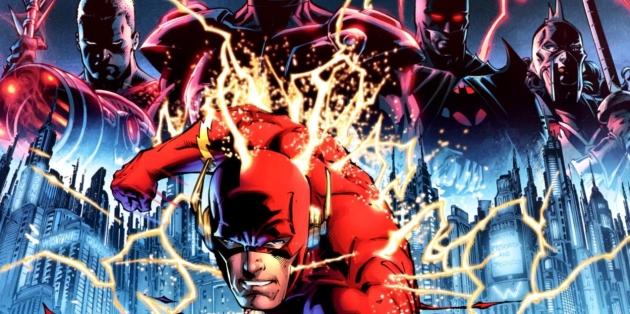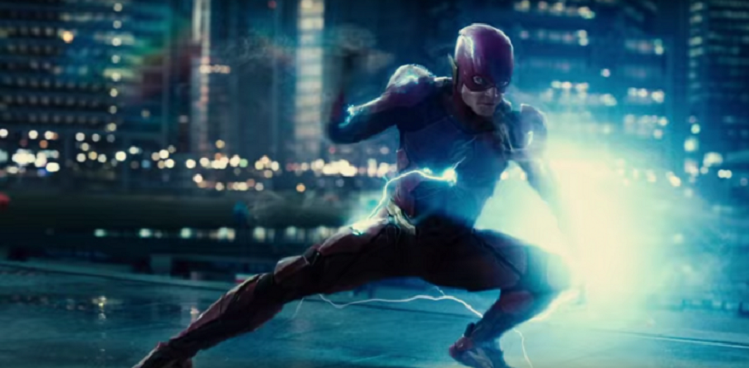While much of the DC Entertainment portion of Warner Bros’ Hall H presentation at the 2017 San Diego Comic-Con focused on the next two movies on the DCEU slate, Justice League and Aquaman, one key detail about their other movies stood out. The Flash movie will be an adaptation of the famed Flashpoint comic book story.
For those who don’t know, Flashpoint was a 2011 comic from Geoff Johns and Andy Kubert which saw Barry Allen travel back in time to prevent his mother’s murder by Eobard Thawne, the Reverse-Flash. As a result, a Butterfly Effect-esque ‘flashpoint’ causes the DC Universe to develop in a radically different way. But the roots of Flashpoint go even further back, to another Geoff Johns written Flash tale.
The Flash: Rebirth was a 2009 story by Geoff Johns and Ethan Van Sciver that brought Barry Allen back from the dead. While its focus was finding Barry a place in a DC Universe that he had been absent from for over 20 years, it also revisted his origin story. Rebirth was the first time the now familiar elements about his mother’s murder and his father being imprisoned for a crime he didn’t commit were added to the Flash mythos. Rebirth and Flashpoint are the two bookends that have defined Barry Allen’s journey since then, not only in comics, but in TV and animation.
So it’s really not all that surprising that we’re going down this road again with The Flash movie. It was already established in the first trailer for the Justice League movie that Dr. Henry Allen (played by Billy Crudup) is doing time for the murder of his wife, and with Rebirth and all its attendant elements considered the definitive Flash origin story, there’s no reason why Ezra Miller’s interpretation of the character should be any different. But making his first big screen adventure Flashpoint is raising some eyebrows.
For one thing, it was only last year that The Flash TV series did its own version of Flashpoint, and the broad strokes of that story and its repercussions accounted for a significant chunk of the show’s second season. The key difference there was that the repercussions of Barry’s actions were, compared to the comics, fairly minor. The TV Flashpoint was used to tell a more intimate, personal story, and the results weren’t as world-changing as the ones in the comics. And that larger scale potential for Flashpoint is where the movie comes in.
In the comics, after saving his mother’s life, Barry wakes up in a world where Atlantis (led by Aquaman) and Themiscyra (led by Wonder Woman) are waging war on each other. Bruce Wayne never became Batman, but Thomas Wayne did, in order to avenge the murder of his son (the less said about what happened to Martha Wayne in the Flashpoint reality, the better, but needless to say, the DCEU may be headed toward an even more cringeworthy “Martha” moment if they decide to do a really faithful adaptation). Kal-El’s rocket was found by the government, who raised a tortured, frightened, frail alien child in an underground bunker to keep his powers from manifesting in the light of the yellow sun.

In other words, the first big screen Flash movie has the potential to double as an alternate reality Justice League film. Keep in mind that the Justice League movie was originally announced as a two-parter, back during that brief period where splitting major blockbusters (like the final Harry Potter and Hunger Games films) into two movies was the fashion. Then it was revealed that Justice League and Justice League 2 would be standalone films. Then Justice League 2 lost its release date. Meanwhile, The Flash movie, which had long been scheduled for March 2018, has gone through a parade of directors and scripts, with Warner Bros clearly struggling to find the right approach for one of their key characters.
Complicating things further, the The Flash TV series has a devoted fanbase, and there’s going to be perceived competition between the two interpretations, despite the best intentions of Warner Bros and DC Films. The TV series was able to execute Flashpoint because they waited until the show had two full seasons under its belt, and audiences already had a deep connection to Barry, his struggle to come to terms with the fate of his parents, and his battle with Reverse-Flash. By the time the Flashpoint movie comes around, moviegoers will only know Ezra Miller’s Barry Allen from the time they spend with him in Justice League.
But let’s set that aside for the moment and give the suddenly resurgent DCEU the benefit of the doubt. Based on the little we’ve seen of him in the trailers for Justice League, Ezra Miller’s Barry Allen looks like a lot of fun and it should be easy for fans to warm up to him. There are some visual tricks on display that certainly couldn’t be executed on a TV budget. So let’s just take a minute to consider what a big screen version of Flashpoint could look like.
While both Wonder Woman and the footage released so far from Justice League indicate a shift away from the Batman V Superman: Dawn Of Justice, the DCEU still strikes a more somber, serious tone than chief competitor Marvel Studios. Flashpoint, with the almost (but not quite) dystopian elements like the threat of a war between two mythical kingdoms that could engulf the globe, and the impossible choices Barry has to make between saving his loved ones and doing what’s right for all of reality, are all elements that would feel right at home in the DCEU.
Flashpoint allows the studio to explore elements of Barry Allen’s origin story without falling into the traditional ‘first superhero movie’ structure. And its potential for notable superheroic guest stars also sets it apart from the TV series, which will help negate those concerns about having a piece of intellectual property competing against itself. No superhero movie has yet dealt explicitly with alternate timelines or realities, and that would help distinguish itself even further from the competition.
Conveniently, Flashpoint could serve as something of a placeholder for Justice League 2, with roles for Jason Momoa, Gal Gadot, Ray Fisher (Cyborg was a major part of at least one pre-Flashpoint draft of the movie, and he features in the comic version of the story), and even Henry Cavill if they really want to explore that world.
But what about Batman? After all, Batman remains the world’s most bankable box office superhero, and putting him in a superhero movie seems to be something of a safety valve for Warner Bros when testing out new franchises (Suicide Squad) or giving a shot in the arm to a character they deem is underperforming (Superman).
While Bruce is taking a dirt nap in the Flashpoint reality, we do already have a big screen Thomas Wayne, in the form of The Walking Dead‘s Jeffrey Dean Morgan. The idea of putting Mr Morgan in a modified Batman suit and teaming him up with Ezra Miller’s Barry Allen seems pretty appealing, and it would certainly sell some tickets.
DC Films has mostly chosen to establish the broader DC Universe with films like Batman V Superman, Suicide Squad, and Justice League rather than focus on traditional origin stories and standalone films (Wonder Woman is an exception, because after 75 years, she deserved a proper introduction on screen). Flashpoint broadens the scope further, and allows for the introduction of time travel and Multiverse theory, both of which are key components of the DC Universe. It’s another bold choice, and with the right director (names like Robert Zemeckis and Matthew Vaughn have been connected to the project), it might just work.

